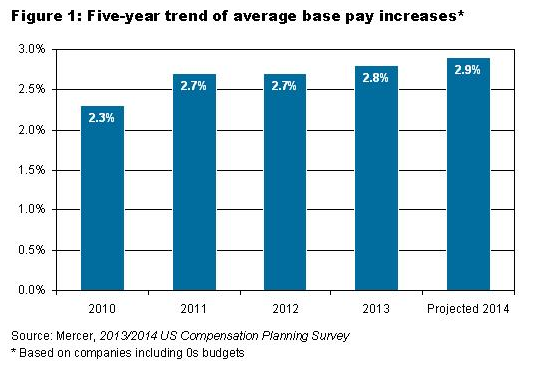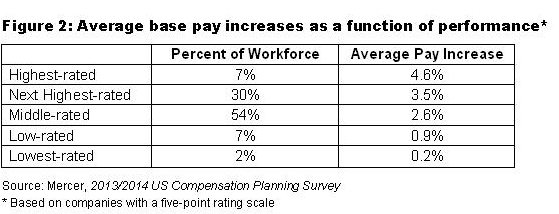According to a recent compensation study by Mercer, the average projected merit increase for 2014 will be 2.9 percent, which is slightly higher than last year.
As organizations look for enhanced ways to pay for performance, they are segmenting their workforce by high-performing as well as high-potential employees. The survey suggests that companies are rewarding these groups with significantly larger increases than those in the lower-performing categories.
The Mercer research also suggests that organizations are studying the key drivers of employee engagement and targeting certain groups, such as high-potentials or those with critical skills, with enhanced reward programs. They are investing in a variety of practices to strengthen employee engagement and help improve work-life balance overall for employees. According to Mercer’s survey, some of the more prevalent practices include sponsored conferences, professional development events, additional non-monetary recognition awards, and enriched job sharing/flexible hours.
As a job seeker, understanding the rewards system of an employer can help make you a better negotiator when you land your next job and are ready to talk about compensation and benefits. These survey results suggest that companies are embracing a pay for performance culture and reserving the highest merit increases for the best performers while more carefully scrutinizing the work of average or below average performers. Job seekers have an opportunity to prove their value to a company in a business environment that is already hyper-sensitive to the costs associated with poor performers. Job seekers may find that in this economy, employers are more open to negotiate flex-time, telecommuting, job sharing and other non-traditional work arrangements in their continuous efforts to cut costs. And job seekers may be surprised to find increasing levels of employee engagement through inexpensive but intrinsically valuable rewards programs and career development options.
There are plenty of ways to “sweeten the pot” when negotiating for your next position. Think strategically about how to prove your value and create a “win-win” negotiation that leverages monetary and non-monetary rewards to carve out the best possible package for yourself.




